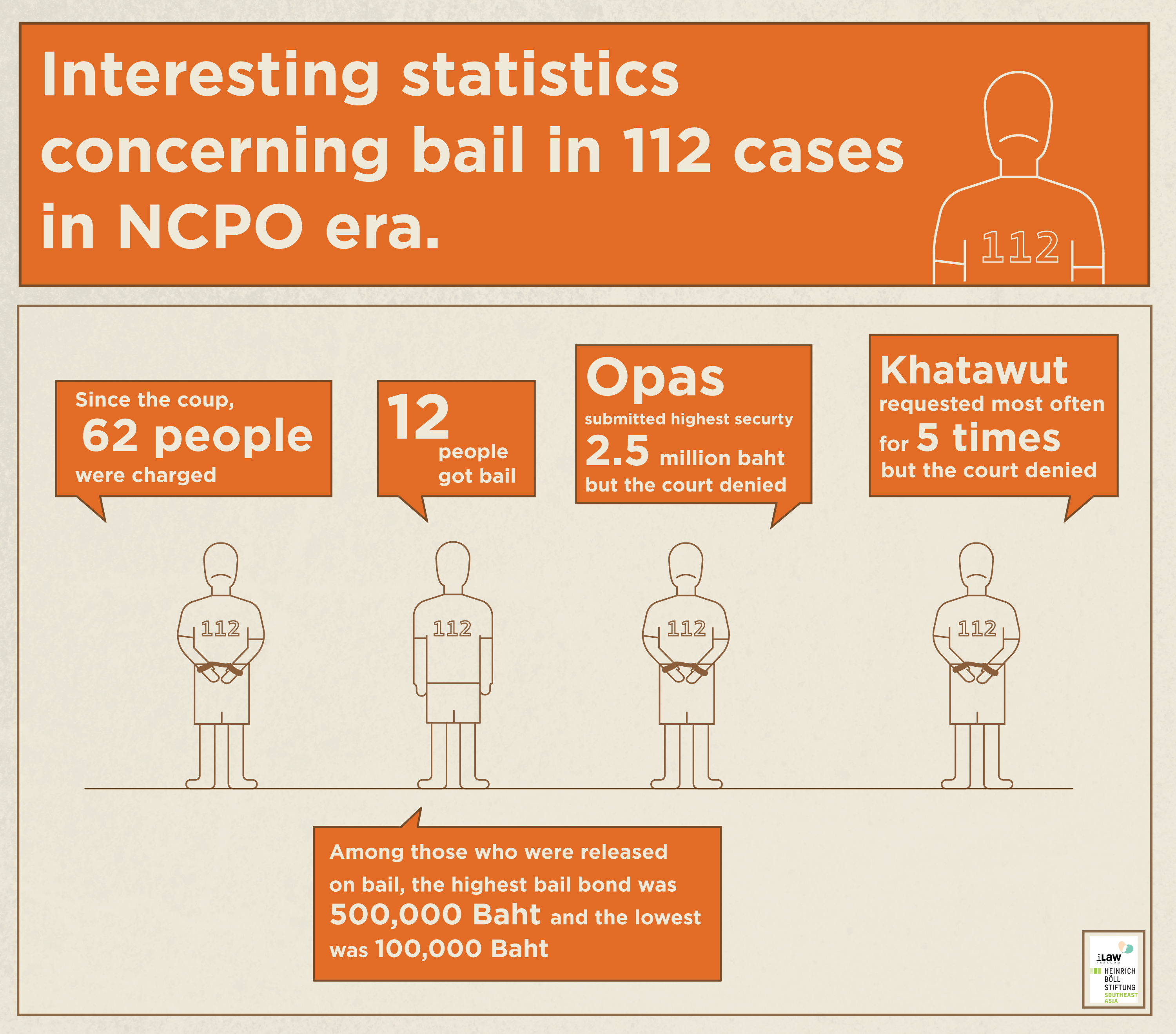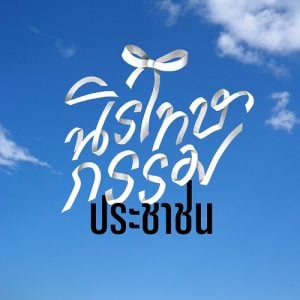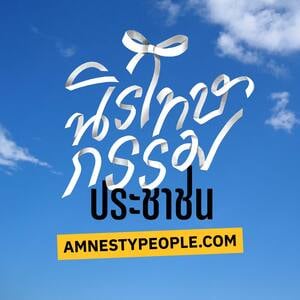On 8 March 2016, Thanakorn, a lese majeste defendant under section 112 of the Criminal Code, was accused of having clicked “Like” lese majeste Facebook page and of having posting sarcastic comment on the King’s dog. The Bangkok Military Court granted him bail which cost 500,000 Baht together with the condition that he could not leave the country. Before he was released, Thanakorn had been detained in prison for 86 days. He is considered the latest of 112 defendant who was granted bail, among many defendants who were not bailed.
Look back at interesting statistics concerning right to bail of people charged with section 112 in NCPO era.
Since the coup, 62 people were charged and 12 of them were granted bail.
As far as we recorded, Thanakorn is a defendant under section 112 and is the 12th person granted bail from 62 people.
Among 12 people, the Bangkok Military Court granted bail for six defendants, two defendants at the 23rd Military Circle Court in Khonkaen Province, one at Chiangrai Military Court, one at the Criminal Court and two were bailed at the investigation stage.
The table with people charged under section 112 could be found at: http://freedom.ilaw.or.th/en/content/charges-against-individuals-after-2014-coup
Bail bond: Highest 500,000 Baht and lowest 100,000 Baht
With regards to bail security, with the information we have, Thanakorn posted the highest bail bond which cost 500,000 Baht. At first, he had agreed to submit 900,000 Baht in cash as a bail guarantee; however, when the Bangkok Military Court had allowed the bail, it decreased the bail to 500,000 Baht.
Cases with second highest bond are Bandit, “Ness” and Nirand who submitted a 400,000-Baht bail bond. In Prachakchai’s case, after a doctor diagnosed that he was mentally ill and was sick with liver disease, the Bangkok Military Court imposed the lowest bail bond in the form of Government Savings Bank lottery in the amount of 100,000 Baht.
The highest bond submitted, but the Court did not grant the bail was 2.5 million Baht.
At least 48 defendants have been detained. Some of the detainees did not request bail as they did not have assets. However, in other cases, some of the detainees submitted a bail request; however the court did not grant bail.
Opas, an elderly defendant from a case where a person wrote on a toilet wall, has chronic health problems such as blood pressure and eye disease. He submitted a bail bond on four occasions in the form of land title deed with a value of 2.5 million Baht, together with medical treatment history; nonetheless, the court rejected his requests on all four occasions.
The case of which the highest bail request which was rejected is Khatawut who submitted a bail request on five occasions.
Khatawut, the defendant who was accused of having carried on a radio programme with content that defamed the monarchy and of having diffused it on the Internet. He submitted the highest number of bail requests which was five times. Four of them were submitted before the Criminal Court when a detention request was made and the 5th occasion was at the Bangkok Military Court. (In Khatawut’s case, the first detention request was made before the Criminal Court. However, later the case was moved from the Criminal Court to the Bangkok Military Court. He submitted the highest bail bond with the value of 500,000 baht; however, the Court turned all the requests down.
If we include cases before the NCPO, Somyot Prueksakasemsuk, former editor of Voice of Taksin magazine who was prosecuted in 2011, is the defendant who submitted the highest number of bail requests. From the information we have recorded, he submitted 16 requests. The requests consisted of two land title deeds with the value of 3.7 million Baht. However, his requests have never been granted.

In principle, the accused or defendant in criminal cases has a right to bail and the court must primarily grant the bail. In cases where the court rejects the bail request, it should fall into an exception that it is reasonable to believe that there is a tendency that the defendant would flee or has the ability or power to tamper with evidence. Nonetheless, in the case of defendants of section 112, the consideration for bail seems to go in the opposite direction since mostly the bail requests of defendants are denied. In many cases, the reason that the court provides for not granting bail is that it is concerned with national security, damage to the public’s feelings and because the sentence for the offence is high, and therefore, it is believed that the defendants would flee if they are granted bail.
For example, Opas who is an elderly man with a family and fixed domicile in Thailand and who has health issues; thus, he would probably not flee.
Another case is Tanet, a defendant who was accused of sending a foreigner an email with a link containing content insulting the monarchy, is mentally ill and needs to be taken care of by his relatives. Both Tanet and his family are poor; it is unlikely that he will flee.
The fact that the Bangkok Militay Court granted bail in the case of Thanakorn is a guarantee of right to fair trial of defendants in criminal cases. It should be applied to other accused or defendants. The presumption of innocence for the accused and defendants in criminal cases until the court renders a final decision is a principle accepted worldwide.
A denial of bail request made by the accused or defendant without necessary and reasonable grounds could be deemed as a detention of innocent persons. Previously, there were cases of Jaruwan, Anon and Chatchai, the accused who were arrested as there were messages defaming the monarchy on Jaruwan’s Facebook. They were detained at the investigation stage for 85 days between November 2014 to February 2015 and later released as the prosecutor did not prosecute the case; they are, therefore, innocent.
Prachakchai, “Ness”, and Chatchai were detained for some period before the court allowed the bail request. Especially in the case of “Ness”, the court decided to put him on suspension. In the case of Chatchai, in the end the prosecutor decided not to prosecute the case. They have lost their time and opportunity while they were being detained and no one is responsible for it.
It would be great if Thanakorn’s case could be a crucial milestone demonstrating that the court considers the right to bail of defendants in the criminal justice more and appliesit to the accused or defendants of section 112.
















